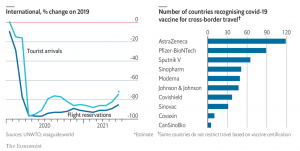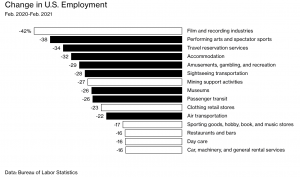The intersection of public health and data privacy with vaccine passports
By Anonymous | September 17, 2021
Countries, states, and cities are implementing and enforcing vaccine passports. The use of vaccine passports is to provide individuals greater protection against the spread of COVID-19; however, the safety provided comes with concerns over data privacy and ensuring its safe protection, too. On the one hand, vaccine passports supply a universal and standardized solution for ensuring individuals are vaccinated when entering high-exposure areas, such as traveling and large indoor gatherings. With the standardization comes data privacy risks and concerns with respect to the Fair Information Practice Principles.
Return to Normalcy
Since the beginning of the pandemic, travelling and tourism declined due to legal restrictions coupled with peoples’ fear of contracting the virus during travel. Vaccine passports give individuals the relief of knowing that others around them are vaccinated, too, while businesses receive an opportunity to attract more customers. The chart on the left illustrates the dip in tourism and flight travel during the pandemic; whereas the chart on the right shows the global recognition of multiple vaccines. All to indicate that there are several vaccines that are recognized around the world for potential vaccine passports and that the travel and tourism industries would benefit from such programs.

Not only do businesses benefit from vaccine passports as it could attract more customers to return, but unemployed workers would as well. Unemployed individuals would benefit from vaccine passports as it would trigger an increase in customer activity, which, in turn, increases the need for businesses to hire more. The image below visualizes the hardest hit sectors by change in employment. The largest negative changes were seen in industries that rely on large gatherings and crowds. Thus, if vaccine passports can bring us back to normalcy faster, then businesses can recover faster and more people can be re-hired.

Transparency
The European Union is rolling out a vaccine passport with its data privacy grounded in the GDPR framework, which addresses transparency – individuals should be given detailed information on how the data will be collected, used, and maintained – with the GDPR’s transparency, purpose limitation, and security principles. Through the GDPR, individuals will have a transparent understanding of the purpose for which the data will be used, and only for that purpose, and be ensured that the data will be “processed in a manner that ensures appropriate security of the personal data” (ICO 2018). However, this only applies to the individuals with the EU vaccine passport. There are other countries, Malaysia and China for example, that do not follow GDPR as the basis of its data transparency for vaccine passports. This can cause a concern for how the data could be used for other purposes post-pandemic. A vaccine passport gives transparency to businesses and governments on the vaccination status, the individuals participating should receive the same level of transparency on how their data will be stored and for what direct purposes.
Individual Participation & Purpose Specifications
Individual participation with vaccine passports comes into question as countries and governments that require vaccine passports to attend indoor dining, large indoor events, etc. force participation. If an individual wants to participate in such events, then their participation in enrolling in a vaccine passport system is required. This forced consent for an individual to provide data to be able to enjoy these activities causes an ethical dilemma of what other activities could soon require individuals to use a vaccine passport and risk their personal data privacy. In addition, the term length of vaccine passports is unknown as the pandemic continues to fluctuate, which causes issues with the purpose specifications principle – clearly stated uses of the collected data. The issue is that individuals that provide their personal information for entry into a vaccination program may not know how long their data will be kept as the use case for it could continue to be extended if never retired.
Accountability and Auditing
With the United States rejecting a federal vaccine passport, states, cities, and private entities have developed and instituted their own vaccine approval programs. The uncoordinated effort for a single, standardized program within the U.S. brings attention to accountability and auditing problems in ensuring proper training to all the people involved in the data collection, processing, and storage components. States and cities may have training programs for data collection, but private entities that are looking to rebound from a tough 2020 economic dip may not have the resources and time to train their employees and contractors on proper data privacy practices. Therefore, by the federal government not implementing a nationwide program, individuals that consent to providing their data for vaccine-proof certification may risk potential data concerns with a lack of training for people collecting and using the data.
Summary
Vaccine passports have great potential in limiting the spread of the virus by giving individuals and organizations visibility and assurance of vaccination status for large groups. However, vaccine certification programs need to give individuals transparency into the clear and specific uses of their information, provide term limits for purpose specifications, and ensure that people who will be collecting, using, and storing the data are properly trained in data privacy practices. If these concerns are addressed, then we could see more adoption of vaccine passports to combat the spread of the virus. If not, then individuals’ mistrust of data privacy will persist and returning back to normalcy may take longer than hoped.
Elevator Pitch
Vaccine passports have great potential in limiting the spread of the virus by giving individuals and organizations visibility and assurance of vaccination status for large groups. However, vaccine certification programs need to give individuals transparency into the clear and specific uses of their information, provide term limits for purpose specifications, and ensure that people who will be collecting, using, and storing the data are properly trained in data privacy practices. If these concerns are addressed, then we could see more adoption of vaccine passports to combat the spread of the virus. If not, then individuals’ mistrust of data privacy will persist and returning back to normalcy may take longer than hoped.
References
- Baquet, D. (2021, April 22). The controversy over vaccination passports. The New York Times. Retrieved September 13, 2021, from https://www.nytimes.com/2021/04/22/opinion/letters/covid-vaccination-passports.html.
BBC. (2021, July 26). Covid passports: How do they work around the world? BBC News. Retrieved September 14, 2021, from https://www.bbc.com/news/world-europe-56522408.
Martin, G. (2021, April 28). Vaccine passports: Are they legal-or even a good idea? UC Berkeley Public Health. Retrieved September 14, 2021, from https://publichealth.berkeley.edu/covid-19/vaccine-passports-are-they-legal-or-even-a-good-idea/. - Schumaker, E. (2021, April 10). What to know about COVID-19 vaccine ‘passports’ and why they’re controversial. ABC News. Retrieved September 14, 2021, from https://abcnews.go.com/Health/covid-19-vaccine-passports-controversial/story?id=76928275.
- The principles. ICO. (2018, May 25). Retrieved September 14, 2021, from https://ico.org.uk/for-organisations/guide-to-data-protection/guide-to-the-general-data-protection-regulation-gdpr/principles/.
- Turner-Lee, N., Lai, S., & Skahill, E. (2021, July 28). Vaccine passports underscore the necessity of U.S. privacy legislation. Brookings. Retrieved September 14, 2021, from https://www.brookings.edu/blog/techtank/2021/06/28/vaccine-passports-underscore-the-necessity-of-u-s-privacy-legislation/.
